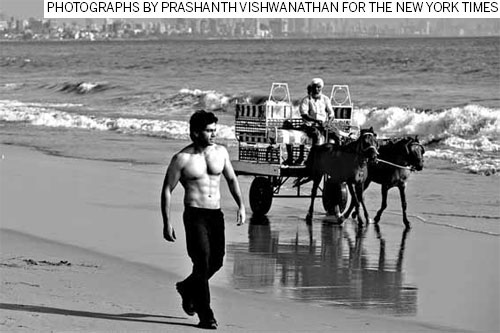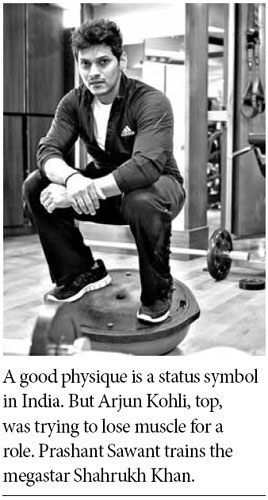
 'Taken 2' grabs movie box office crown
'Taken 2' grabs movie box office crown
 Rihanna's 'Diamonds' tops UK pop chart
Rihanna's 'Diamonds' tops UK pop chart
 Fans get look at vintage Rolling Stones
Fans get look at vintage Rolling Stones
 Celebrities attend Power of Women event
Celebrities attend Power of Women event
 Ang Lee breaks 'every rule' to make unlikely new Life of Pi film
Ang Lee breaks 'every rule' to make unlikely new Life of Pi film
 Rihanna almost thrown out of nightclub
Rihanna almost thrown out of nightclub
 'Dark Knight' wins weekend box office
'Dark Knight' wins weekend box office
 'Total Recall' stars gather in Beverly Hills
'Total Recall' stars gather in Beverly Hills
Bollywood inspires a new desire for muscles
Updated: 2012-07-30 13:27
By Jim Yardley (The New York Times)
|
||||||||

For his starring role in the recent action movie "Ishaqzaade," the young actor Arjun Kapoor did the prep work expected of an aspiring leading man in Bollywood. He took acting classes. He worked on his dancing. And he spent months transforming his flabby stomach into a gym-hardened washboard of so-called six-pack abs.
In the film, Mr. Kapoor fires pistols, stares down rivals and woos his love interest, keeping his abdomen on reserve until the "item number," the song-and-dance routine common in most Bollywood movies. Then he lustily pulls up the bottom of his shirt, biting it between his teeth, as he undulates his exposed stomach toward his female prey, the dancer Gauhar Khan. It is the film's ab moment.
"The audience likes to see that in a man," Mr. Kapoor said of his abdominal muscles.

India has long defined national well-being by the stomachs of its people. Malnutrition remains a pressing national problem, and yet after two decades of rising economic growth, India's middle class is now dealing with rising obesity.
Bollywood, of course, is India's dream factory, more interested in fantasy than reality. Beginning in the 1990s, actors like Sanjay Dutt and, most famously, Salman Khan began muscling up, mimicking their peers in Hollywood, Sylvester Stallone and Arnold Schwarzenegger. Indian men were soon mimicking the Indian stars. Fitness centers, once almost nonexistent in India, quickly spread.
Rachel Dwyer, a leading scholar of Indian cinema, said early male stars like Dilip Kumar and Dev Anand never took off their shirts or drew attention to their bodies. Now Indian actors are waxing their legs or chests and posing for suggestive photographs. A fit body, Ms. Dwyer said, has become a status symbol. "The muscular body is very much a class thing," she said. "The whole fitness cult in India is a marker of upward mobility."
Today, almost every Bollywood star swaggers and flaunts his body on-screen. Personal trainers have become minor celebrities in Mumbai. And the abdominal muscles - known as the six-pack - have become a source of bragging rights for the biggest stars, like the megastar Shahrukh Khan. He recently boasted that he was training to get an eight-pack for an upcoming film.
"There's no other film industry in the world where people are talking about how many packs they have, or their abs," said Anuparma Chopra, a Bollywood commentator and talk show host.
| Related: |
Anupam Kher, a veteran actor who runs an acting school, said: "Now you are luring audiences not only with the story and the stars. You are luring them with six-packs, saying this is how your body should be."
For Mr. Kapoor, the lead role in "Ishaqzaade" required a physical makeover. He had been an overweight assistant director when Salman Khan encouraged him to take up acting - assuming he got into shape.
For Mr. Kapoor, the six-pack represented a personal triumph.
"I had one big ab that has been processed into six," he joked.
The New York Times
Most Viewed
Editor's Picks

|

|

|

|

|

|
Today's Top News
Health new priority for quake zone
Xi meets US top military officer
Japan's boats driven out of Diaoyu
China mulls online shopping legislation
Bird flu death toll rises to 22
Putin appoints new ambassador to China
Japanese ships blocked from Diaoyu Islands
Inspired by Guan, more Chinese pick up golf
US Weekly

|

|






